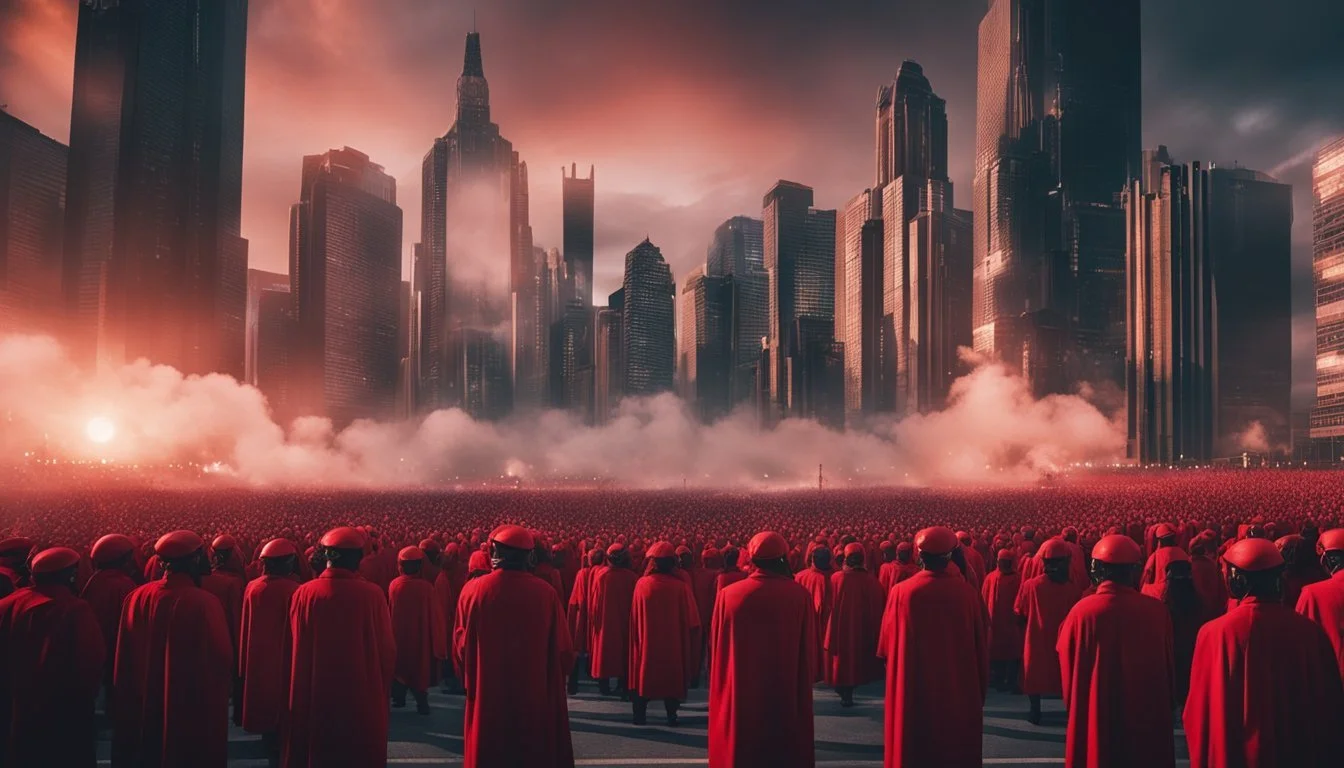9 Documentaries About the Intersection of Literature and Politics
Must-Watch Films for Thoughtful Minds
The intersection of literature and politics offers a fascinating lens through which to explore the societal and cultural dynamics shaping our world. Documentaries focusing on this interplay provide invaluable insights into how literature can influence political thought and vice versa.
These films delve into the lives of influential literary figures and their roles in political movements, examining how their works reflect and react to political climates. By watching these documentaries, viewers can gain a deeper appreciation of how thoroughly intertwined the realms of literary art and political discourse truly are.
1) "The Handmaid's Tale" by Margaret Atwood - Documentary (2019)
"The Handmaid's Tale" by Margaret Atwood has long been a pivotal piece in the realm of dystopian literature and political commentary. The documentary explores the themes and ideas that inspired Atwood's writing.
Margaret Atwood drew influence from historical events and other works of dystopian fiction, such as George Orwell's "1984" and H.G. Wells' novels. The documentary provides insight into how these works shaped her storytelling.
The film also addresses the impact of "The Handmaid's Tale" on contemporary society. It explores the novel's reflection on issues such as totalitarianism, women's rights, and religious extremism.
Interviews with Atwood and literary critics reveal the depth of the novel's critique of societal and political structures. The documentary includes analyses by scholars like Amin Malak and J. Brooks Bouson.
The visual representation of Gilead in various adaptations, including the popular TV series, is also discussed. These interpretations highlight the continued relevance of Atwood's dystopian vision.
For more information on the documentary, visit the IMDb page.
2) "1984" by George Orwell - Documentary (2024)
The documentary on George Orwell's "1984" delves into how the author crafted his dystopian masterpiece. Released in 2024, this film explores the socio-political context that gave birth to the novel.
The documentary highlights Orwell's time on the Isle of Jura, where he wrote much of "1984." It focuses on the mental and physical challenges he faced.
Topics such as totalitarianism, surveillance, and the manipulation of truth are examined. These themes remain relevant, reflecting modern society's ongoing struggles with privacy and governmental power.
Key interviews with literary experts and biographers offer insights into Orwell's motivations. Archival footage adds depth, portraying the turbulent era that influenced his writing.
This documentary is a valuable resource for understanding the enduring significance of "1984." It effectively bridges literature and current political issues.
More Information
3) "The Man Who Knew Infinity: A Life of the Genius Ramanujan" by Robert Kanigel
"The Man Who Knew Infinity: A Life of the Genius Ramanujan" explores the life and contributions of Srinivasa Ramanujan, an Indian mathematician whose work significantly impacted the field. The narrative details Ramanujan's journey from a self-taught mathematician in India to his collaboration with the English mathematician G.H. Hardy at Cambridge.
This biography by Robert Kanigel captures the essence of Ramanujan's brilliance and his challenges. The text delves into his background, his groundbreaking ideas on number theory, and his collaboration with Hardy. The book relays not only the professional achievements but also the personal struggles Ramanujan faced, including his health issues and cultural displacement.
Published by Simon & Schuster in 1991, the book has received praise for its meticulous research and engaging storytelling. It was also adapted into a film released in 2015, starring Dev Patel as Ramanujan and Jeremy Irons as Hardy. The film emphasizes the compelling dynamic between the two mathematicians and highlights the intersection of their diverse worlds.
For more information on the film adaptation, visit IMDb.
4) "Persepolis" by Marjane Satrapi (2007)
"Persepolis" is an animated film based on Marjane Satrapi's graphic memoir of the same name. It portrays her childhood and early adult years in Tehran during and after the Islamic Revolution.
The narrative style combines Satrapi's poignant storytelling with stark black-and-white animation. The film captures the interplay between personal and political upheavals in Iran, providing a deeply personal account of historical events.
Satrapi uses her own experiences to highlight themes of identity, freedom, and resistance. The protagonist's journey from a young girl to an outspoken woman mirrors the larger societal changes and the resiliency of the Iranian people.
"Persepolis" won the Jury Prize at the Cannes Film Festival and received an Oscar nomination for Best Animated Feature. Its unique perspective and emotional depth have made it a significant work in both literature and film.
For more information, visit Wikipedia.
5) "The Lives of Others" - Film (2006)
"The Lives of Others" is a German drama film written and directed by Florian Henckel von Donnersmarck. It focuses on East Berlin residents monitored by the Stasi, East Germany's secret police, during the 1980s.
The film follows Stasi Captain Gerd Wiesler, who becomes increasingly absorbed by a writer and his lover as he surveils them. This personal involvement leads to a moral transformation in Wiesler.
Ulrich Mühe stars as the lead character, Wiesler. The film depicts the invasive and oppressive nature of government surveillance and its effects on individual lives.
Winning the Academy Award for Best Foreign Language Film, "The Lives of Others" highlights themes of loyalty, betrayal, and the human capacity for change. The movie's careful portrayal of historical context adds depth to its commentary on personal and political integrity.
More information about "The Lives of Others" can be found on Wikipedia or IMDB.
6) "Fahrenheit 451" by Ray Bradbury - Documentary (2023)
A short documentary exploring Ray Bradbury's "Fahrenheit 451" sheds light on the real-life influences behind the creation of this iconic novel. Made by Dina Pielaet and Michael O'Kelly, it navigates the political and social contexts that shaped Bradbury's dystopian vision.
The film delves into the backdrop of the Cold War era, when "Fahrenheit 451" was first published in 1953. It discusses how the fear of censorship and authoritarian regimes influenced Bradbury's portrayal of a society that bans books and suppresses intellectual freedom.
Viewers gain insight into the character of Guy Montag, a fireman who burns books but eventually rebels against his society's anti-literature stance. By contextualizing Bradbury’s work, the documentary enhances the appreciation of the novel's enduring relevance.
For more information, visit IMDb or Wikipedia.
7) "The Grapes of Wrath" by John Steinbeck - Documentary (2013)
"The Grapes of Wrath" is not just a landmark novel but also a powerful documentary.
The documentary delves into the story of Steinbeck's epic novel, published in 1939, which depicts the lives of migrant farmworkers during the Great Depression.
The film offers a deep dive into the social and economic hardships faced by the Joad family as they journey from Oklahoma to California in search of a better life.
Interviews with historians, literary experts, and farmers who experienced the era provide additional context. These insights help viewers understand the real-life impacts of the Dust Bowl and the Great Depression on American society.
The documentary also explores Steinbeck’s detailed research process. Despite writing the novel quickly, he gathered extensive reports on the living conditions in migrant camps to create an authentic narrative.
The visuals and archival footage used in the film enhance the understanding of the stark realities faced by the characters and real people during that time.
For more information about the film: The Grapes of Wrath - IMDB
8) "All the President's Men" by Carl Bernstein and Bob Woodward
"All the President's Men" (1976) documents the investigative efforts of journalists Carl Bernstein and Bob Woodward. They uncovered the Watergate scandal, which eventually led to the resignation of President Richard Nixon. The documentary meticulously follows their journey from the initial report of a simple break-in to a full-blown political scandal.
Bernstein and Woodward's work is a landmark in journalism, showcasing the power of the press in uncovering political corruption. Their reporting was based on their detailed non-fiction book, first published in 1974. This documentary emphasizes the critical role journalists play in holding those in power accountable.
The documentary highlights the relentless pursuit of the truth by Bernstein and Woodward despite facing numerous obstacles. It sheds light on the importance of investigative journalism in maintaining a democratic society. Their revelations through the pages of The Washington Post not only informed the public but also demonstrated the necessity of a free press.
For more information about the film, visit IMDb.
9) "Reading Lolita in Tehran" by Azar Nafisi (2003)
Azar Nafisi’s memoir, "Reading Lolita in Tehran," documents her experience as a professor of modern literature in Iran. She led a private book club for female students, where they discussed Western literature banned by the regime.
The weekly gatherings provided an intellectual refuge against the oppressive political climate. They explored works like "Lolita" and "The Great Gatsby," drawing parallels between fiction and their own lives.
Nafisi's narrative captures the intersection of literature and politics, revealing how books can challenge authoritarianism. Her memoir paints a vivid picture of life under Iran's Islamist regime and the power of literary resistance.
For more information, visit Wikipedia.
Historical Context
The interplay between literature and politics has been a fertile ground for documentary filmmakers, providing a lens through which viewers can explore political ideologies and historical movements. Understanding the evolution of political documentaries and the influence of literature on political thought is crucial.
Evolution of Political Documentaries
Political documentaries have evolved significantly since their inception in the early 20th century. Initially, these films were used as tools for propaganda during wartime. For example, Leni Riefenstahl's Triumph of the Will showcased Nazi Germany's ideology in the 1930s.
In the post-war era, filmmakers began to use documentaries to critique social and political systems. The 1960s and 70s saw a surge in documentaries that challenged authority, such as Harlan County, USA, which highlighted labor struggles. The digital age has further democratized documentary filmmaking, allowing for diverse voices and narratives to address contemporary political issues.
Influence of Literature on Political Thought
Literature has always had a profound influence on political thought, shaping ideologies and inspiring movements. Classic works like George Orwell's 1984 and Aldous Huxley's Brave New World provide dystopian critiques of totalitarian regimes, influencing both public opinion and policy discussions.
Authors such as Chinua Achebe and Gabriel García Márquez have used literature to expose the impacts of colonialism and political corruption in their respective countries. These works inspire documentaries that explore similar themes, bringing the written word’s powerful insights into the visual realm, ensuring broader accessibility and engagement.
Key Themes in Literature and Politics
Literature frequently intersects with political themes, notably through censorship and freedom of expression, as well as revolution and resistance. These themes explore narratives that reflect the sociopolitical climates of their times and the ongoing struggles of marginalized groups.
Censorship and Freedom of Expression
Censorship and freedom of expression are critical themes where literature often pushes boundaries to critique political systems. Authors have historically faced and responded to government-imposed censorship to silence dissenting voices.
Examples include the censorship experienced by Soviet writers under Stalin, where works were scrutinized, and any form of criticism was dangerous.
Similarly, contemporary writers in various countries continue to face censorship, limiting their ability to discuss sensitive political issues. Literature serves as a medium for challenging such restrictions, advocating for intellectual freedom and the essential right to free speech.
Revolution and Resistance
Revolution and resistance are recurring themes where literature portrays the fervor and struggles of revolutionary movements. This includes the fight against oppressive regimes and the quest for social justice.
For instance, literature from the French Revolution often reflects the revolutionary spirit, portraying the fight for liberty and equality. Similarly, works from Latin American writers frequently depict resistance against colonial and dictatorial oppression.
These narratives highlight the resilience and courage of individuals and groups challenging the status quo, illustrating the power of literature to inspire change and reflect political conflicts.









